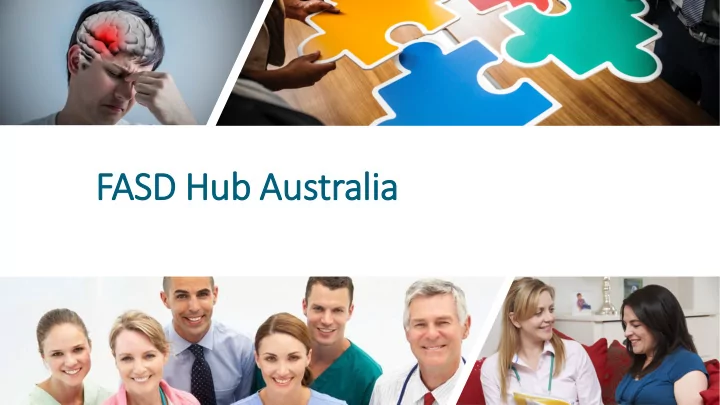

FAS ASD Hu Hub Australia
Identifying the need • Identified as a priority by the National FASD Technical Network chaired by Professor Elizabeth Elliott • Key goal: to develop a one-stop shop for Australian FASD information that is evidence based • Developed in 2017 by an alliance of organisations – University of Sydney, Telethon Kids Institute, NOFASD Australia, Menzies School of Health Research and FASD Clinical Network
Advisory Group Professor Elizabeth Elliott AM , University of Sydney (Chair) Professor Carol Bower , Telethon Kids Institute Magistrate Catherine Crawford , Justice representative Heather D’Antoine , Menzies School of Heath Project Team Research Louise Gray , NOFASD Australia Heather Jones Narelle Mullan , FASD Research Australian Pete O’Malley Centre of Research Excellence Sue Miers , Consumer & Community representative Dave McNally , Australian Government Funded by Department of Health Neil Reynolds , Consumer & Community representative Assoc Prof Doug Shelton , Australian & New Zealand FASD Clinical Network Sue Thomas , Education representative
Information for • Health professionals • Educators • Justice professionals • Researchers • Service providers • Parents & carers • People living with FASD • Policy makers
Informing development • 90 plus individuals and organisations consulted • Workshops with parents & carers • Interviews with parents & carers, health professionals, researchers, government and policy makers • Informed development of key user journeys, functional design and content • Content developed by the Project Team with advice from a Working Group and key stakeholders
Videos produced by the FASD Hub • Overview FASD in Australia • Challenges and strengths • Michael and Lina’s story • Jazpa’s story • Diagnosing FASD • A doctor’s story • Journey to diagnosis • Managing FASD https://www.fasdhub.org.au/fasd- information/understanding-fasd/fasd-hub-videos/
What can you find • Resources • What is FASD? • Training • Living with FASD opportunities • Alcohol use in • Service directory pregnancy • Research • Common myths • Publications • Preventing FASD • Latest news • Diagnosing FASD • Support groups • Managing FASD • Videos https://www.fasdhub.org.au/
Evaluation 2017 • Most responders to the online survey were health professionals (54%) and parents/carers (33%) • Majority of participants found the website: easy or very easy to use met their needs very well or extremely well trustworthy and evidence-based • Top 3 sections Understanding FASD Managing FASD Assessment & diagnosis
Evaluation – new content requested • Series of targeted fact sheets • User-friendly diagram of referral/assessment process • More detailed information on alcohol use in pregnancy • More detailed information on behaviours, managing extreme or inappropriate behaviours • Stories or videos about the behavioural challenges, to balance the more positive stories the FASD Hub website currently has • Information relevant to adult diagnosis and management • Content appropriate for CALD and Indigenous communities
Outcome #1 • Established 30-member Subject Matter Editorial Panel (SMEP) comprising diverse skills and knowledge: lived experience of person with FASD or caring for a person with FASD What have we health and other professionals, done in 2018? researchers in the field of alcohol and pregnancy and FASD and policy makers
Outcome #2 Disability access • Conducted an independent audit followed by technical improvements to the Hub • Hub now meets international WCAG2.0AA accessibility standards Outcome #3 CALD access Improving • Culturally and linguistically diverse (CALD) Accessibility communities are now provided free access to a telephone interpreter service • Fact Sheet developed and will be translated into 12 top languages spoken at home in Australia • Working with Aboriginal Interpreter Services to identify appropriate services across Australia
Outcome #4 • Additional information on alcohol and pregnancy • New infographic on the assessment & diagnostic process Developing • Information on managing complex behaviours new ew content • Information on dual diagnoses • Australian language guide
Outcome #5 • The primary location for the Guide is now the FASD Hub – to allow Australian Au monitoring of use and single authoritative site Guide Gu e to the • 900+ page views in October – the Diagnosis of most visited page on the website • The Guide and eLearning modules are FASD currently being evaluated – get more information from the FASD Hub display table
Outcome #6 • Quarterly E-Newsletter • Social media channels on Facebook and Twitter • FASD Hub promoted at 11+ Other r conferences & workshops in Australia and internationally outcom omes es Outcome #7 • Dedicated section for Indigenous research and resources
Growing success Most popular pages • Australian Guide to the diagnosis of FASD • Videos 460% increase in web • Understanding FASD visits (since Nov2017) • What is FASD 700+ visitors to Hub every week 323 pages viewed every day Other facts • 68 major Australian websites linking to the Hub • 74% accessing Hub on their desktop or laptop showing it’s a resource in the office or home
Audience • 79% female • 54% in 22 – 44 year age demographic • 96% from Australia South Australia Queensland Victoria New South Western Wales Australia
Evaluation 2018 • Come to our display table – complete the survey online or via a hard copy • We will also be conducting short interviews with people to get more in- depth feedback • Evaluation survey closes at the end of November
Contact: Heather Jones E: heather.jones@telethonkids.org.au P: 08 6319 1824 / 0417 068 601 Follow FASD Hub on: Pete O’Malley E: peter.omalley@sydney.edu.au P: 0419 670 078
Recommend
More recommend